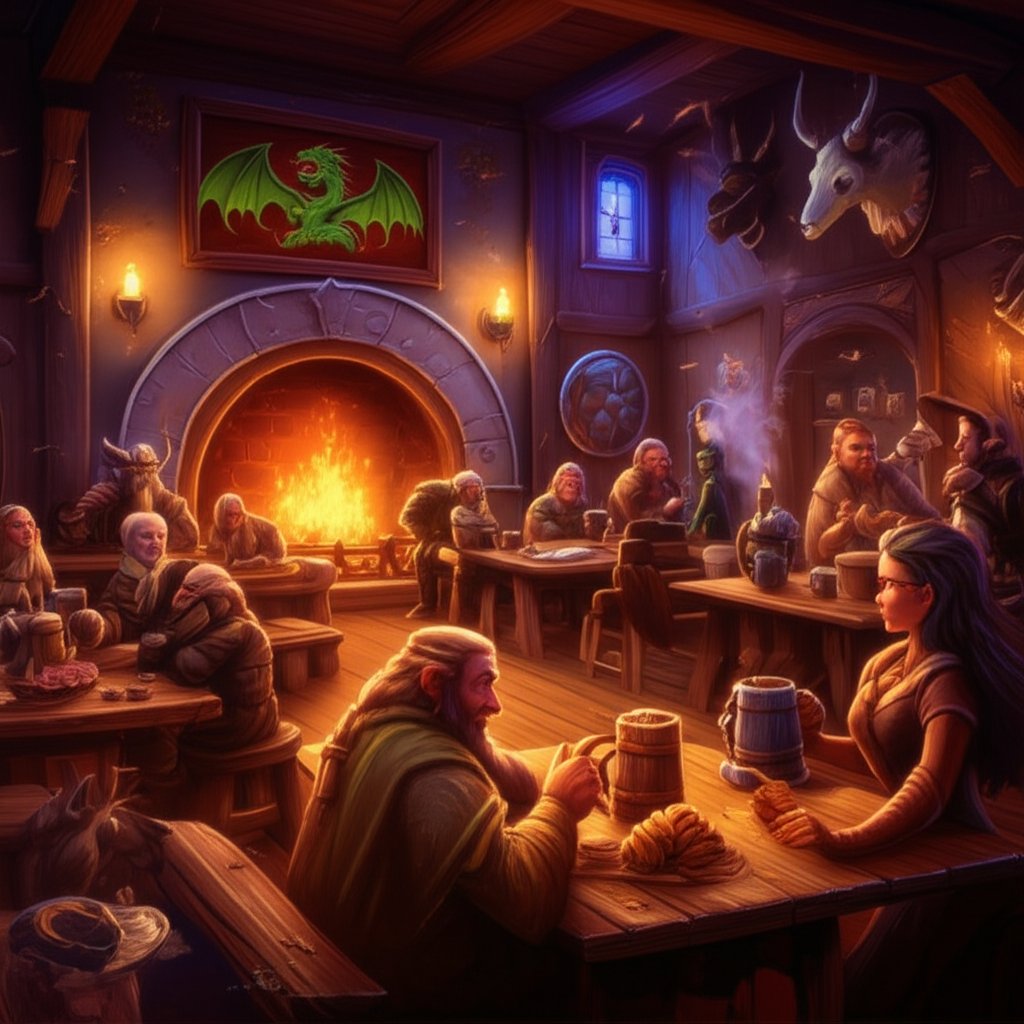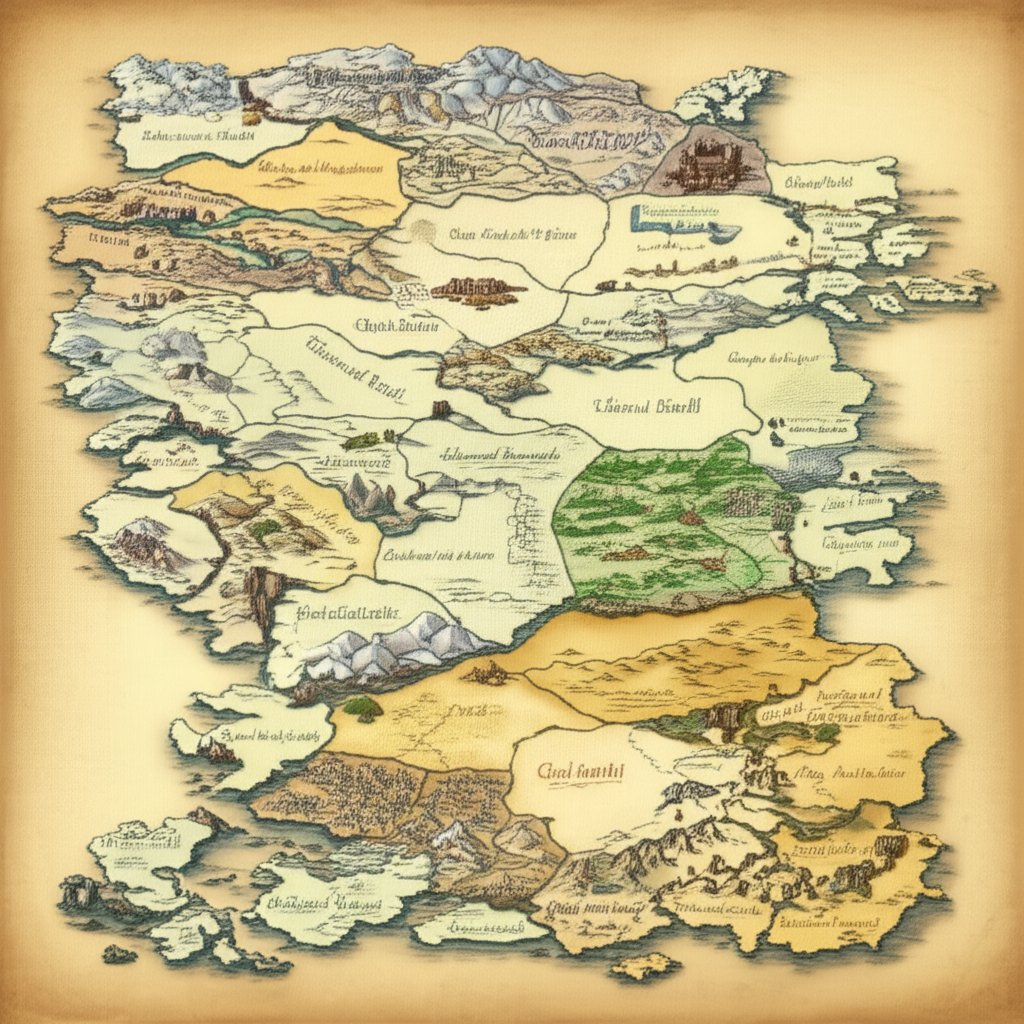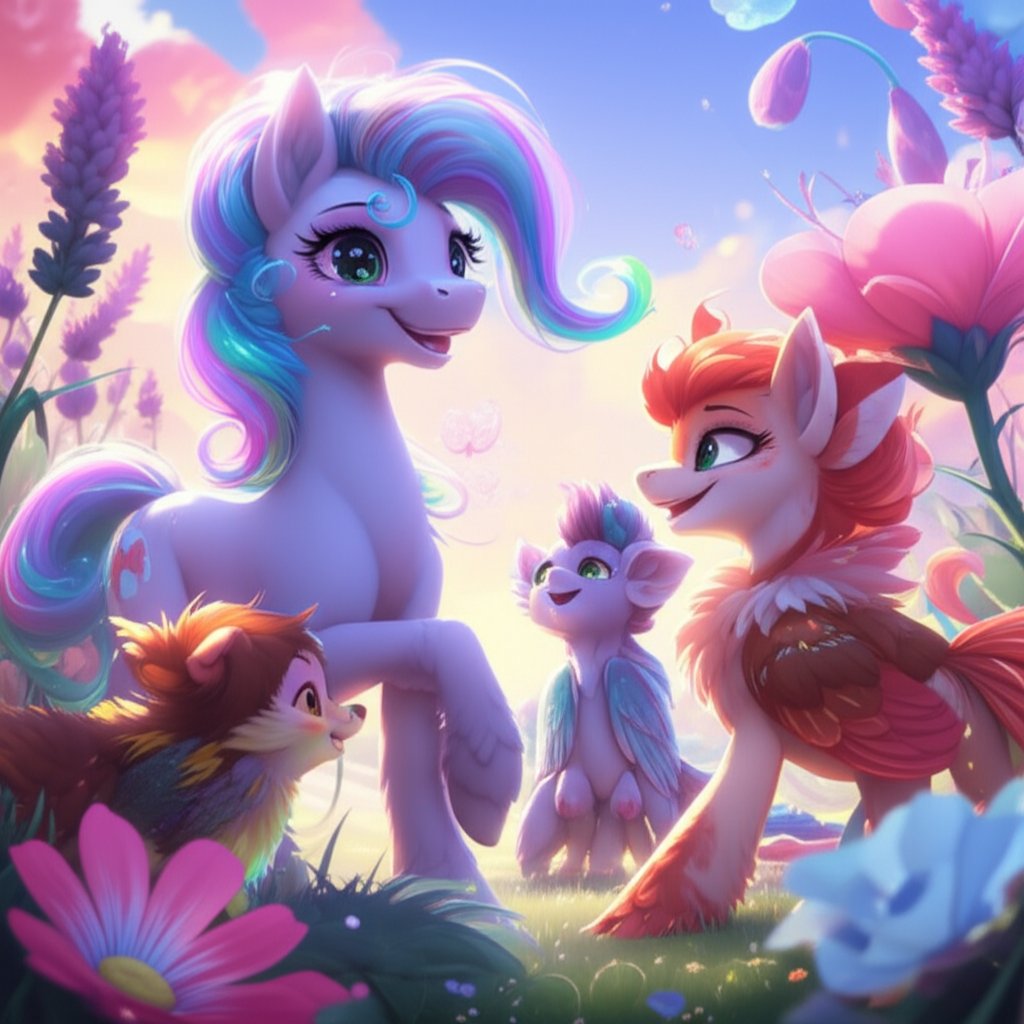Introduction to the Tavern Name Generator
When you picture a bustling fantasy world, what’s one place where heroes, rogues, and mysterious strangers are likely to cross paths? If you said “the tavern,” you’re in good company. Taverns are the lifeblood of countless fantasy settings, from the legendary Prancing Pony in Tolkien’s Middle-earth to the lively Bannered Mare in Skyrim. These establishments aren’t just places to grab a drink—they’re where stories begin, secrets are shared, and adventures take shape[source].
But here’s the catch: coming up with the perfect name for your tavern can be surprisingly tricky. Do you want something cozy and inviting, or mysterious and full of intrigue? Should it hint at the local culture, or stand out as a beacon for travelers from distant lands? The right name sets the tone for the entire experience—whether you’re a game master prepping a Dungeons & Dragons session, a writer crafting a vivid fantasy novel, or a worldbuilder designing your own realm.
Sounds complex? That’s where a tavern name generator or fantasy tavern name generator comes in handy. These creative tools provide instant inspiration, offering a wide variety of names that capture different moods, themes, and settings. You’ll notice that a generator can:
- Jumpstart your imagination when you’re stuck
- Offer names that fit a range of genres—from medieval and rustic to mystical and whimsical
- Save time by providing ready-to-use options or clever starting points for your own tweaks
- Help maintain consistency and depth across your world’s taverns and inns
However, it’s important to remember: a generator is a creative partner, not a replacement for your unique vision. The best results come from blending generated suggestions with your own ideas, ensuring each tavern name feels authentic and memorable.
In this guide, we’ll walk you through everything you need to know about using these tools effectively. You’ll find tips tailored for D&D campaigns, advice for fantasy writers, ideas for themed taverns (pirate, elven, and more), and strategies for customizing names to fit your world. Whether you’re looking for a spark of inspiration or a deep dive into naming conventions, this article will help you unlock legendary names for your next adventure.
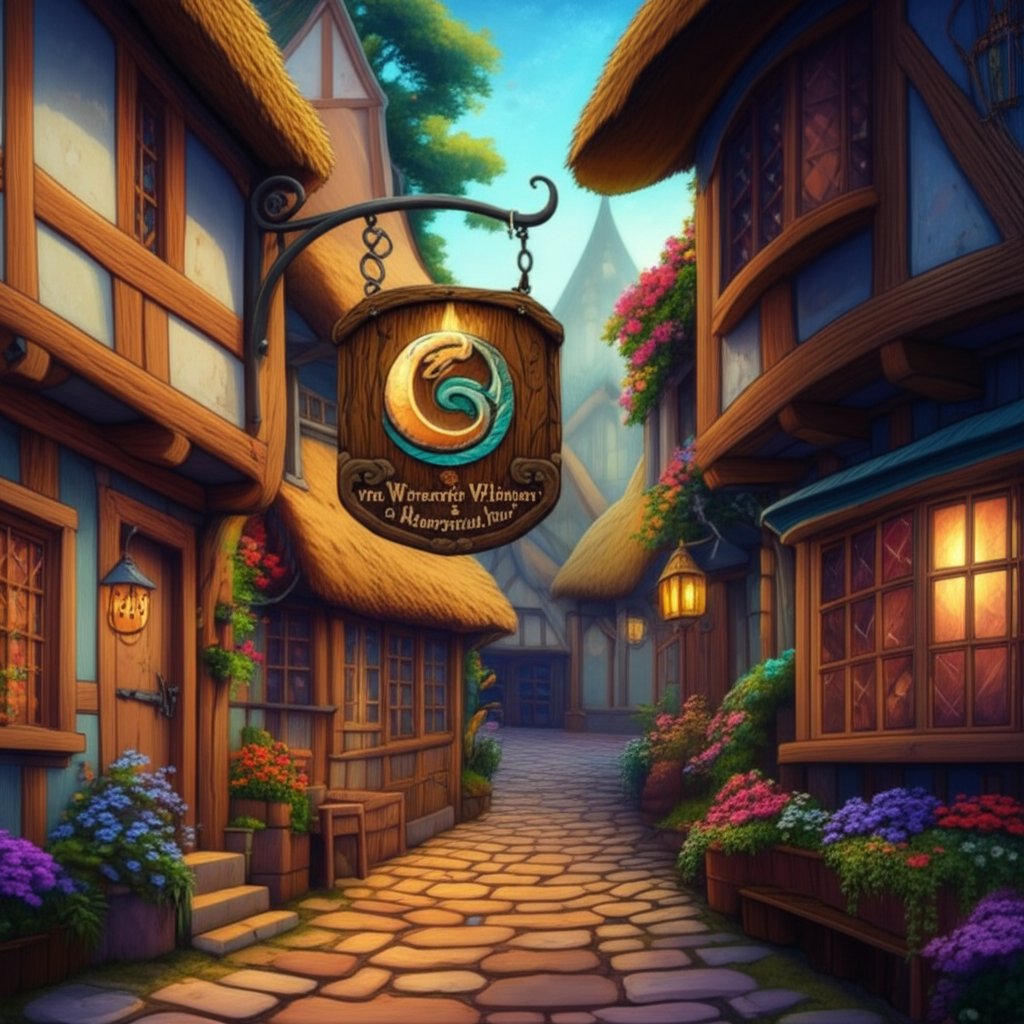
The Core Elements of a Memorable Tavern Name
When you walk into a new town in a fantasy world, what’s the first thing that grabs your attention? For many, it’s the sign swinging above the door of the local tavern. The right name can instantly spark curiosity, set the mood, and even hint at the adventures waiting inside. But what exactly makes certain tavern name ideas stick in your mind while others fade away?
Key Naming Conventions for Medieval Tavern Names
Sounds tricky? Not when you break it down. Most memorable tavern names follow a few tried-and-true patterns. Here are some of the most effective naming conventions you’ll spot in both classic literature and modern games:
- Adjective + Noun: This is perhaps the most iconic formula. Think "The Drunken Hearth" or "The Gilded Goblet". The adjective sets the tone—cozy, mysterious, or rowdy—while the noun anchors it in a specific image or theme[source].
- Owner’s Name: Naming the tavern after its proprietor personalizes the establishment. Examples include "Martha’s Mug" or "Old Tom’s Taproom." This approach often hints at the tavern’s history or reputation.
- Landmark or Location: Taverns often borrow their names from nearby features. "The River’s Edge Inn" or "Cliffside Tavern" immediately tell you something about where you are, grounding the tavern in its world.
- Action or Event: Names like "The Midnight Blade" or "World’s End Inn" hint at a story or a dramatic event. These names can serve as plot hooks or foreshadowing devices in your campaign or novel[source].
- Object or Creature: Medieval tavern names frequently reference animals, mythical beings, or objects. Examples include "The Prancing Pony," "The Mystic Cauldron," or "The Cackling Chimera." These names add a fantastical flavor and can allude to the clientele or the tavern’s specialties.
How Word Choice Sets the Tone and Immersion
Ever notice how the name "The Velvet Veil" feels completely different from "The Rusty Rapier"? That’s no accident. The words you choose do more than just label a place—they build atmosphere. Here’s how:
- Cozy and Welcoming: Names like "Ember Hearth Alehouse" or "The Fiddler’s Flask" create a sense of warmth and comfort. They invite travelers to relax and share stories.
- Dangerous or Mysterious: Taverns such as "The Bloody Maw" or "Serpent’s Secret Saloon" suggest intrigue, hidden dangers, or a rough crowd. These are perfect for settings where adventure (or trouble) lurks just around the corner.
- Mystical or Enchanted: "The Enchanted Elm" or "Moonshadow Tavern" evoke a sense of wonder, making them ideal for worlds rich in magic or legend.
Choosing the right words helps you match the tavern’s name to its role in your story or campaign. Is it a safe haven, a den of thieves, or a hub for arcane secrets? The name should reflect that.
Examples: Bringing It All Together
Let’s see these principles in action. Imagine you’re building a bustling port city. You could use:
- The Salty Siren – Adjective + Creature, hints at a nautical theme and possible merfolk legends.
- Captain Brigg’s Rest – Owner’s Name + Action, personalizing the tavern and hinting at its founder.
- The Lighthouse Lantern – Landmark + Object, grounding the tavern in a recognizable location.
By blending these elements, you’ll create tavern names that not only sound authentic but also enrich your world’s atmosphere. Up next, we’ll explore how to tailor names for your D&D campaign and make each establishment truly unforgettable.
Finding the Perfect Name for Your D&D Campaign
When you’re planning your next Dungeons & Dragons session, have you ever paused and wondered: what makes a tavern truly unforgettable for your players? Is it the food, the rumors, or the quirky barkeep? More often than not, it all starts with a name. The right name doesn’t just label a place—it sets the stage for adventure, intrigue, and immersion.
Why a Tavern’s Name Matters in D&D
In D&D, taverns are more than just backdrops. They’re quest hubs, rumor mills, and sometimes even safe havens from the chaos outside. Imagine your party stumbling into “The Midnight Blade”—immediately, players expect shadows, secrets, and maybe a few dangerous patrons. Contrast that with “The Hearthstone Inn,” and you’ll sense a place of warmth and comfort, perfect for resting and regrouping. The name acts as a promise: it hints at the tavern’s role in your story, the kind of clientele it attracts, and the adventures that might begin within its walls[source].
- Quest Hub: Names like “The Hero’s Respite” or “The Bannered Mare” signal a gathering place for adventurers and informants.
- Rumor Mill: "The Whispering Mug" or "The Gossamer Goblet" suggest a place where secrets flow as freely as the ale.
- Safe Haven: "The Ember Hearth" or "The Gentle Giant" evoke a sense of security and camaraderie.
Choosing a name that reflects the tavern’s function helps players intuitively understand its importance and the kinds of stories that might unfold there.
How to Use a DND Tavern Name Generator Effectively
Stuck for ideas? That’s where a dnd tavern name generator comes in handy. These tools are designed to spark inspiration, especially when you’re pressed for time or need to populate a bustling city with several unique establishments. But how do you get the most out of them?
- Match the Tone of Your Campaign: Is your world high fantasy, grimdark, or full of political intrigue? Use keywords or filters in your generator to reflect your setting. For example, “The Gilded Griffin” suits a noble district, while “The Broken Dagger” might fit a rougher part of town.
- Customize for Location and Clientele: Think about where the tavern sits on your map. A seaside inn could be “The Salty Anchor,” while a forest outpost might be “The Wandering Stag.” Tailoring names to geography and the people who frequent them makes your world feel more alive.
- Use Generators for Quick Inspiration, Then Tweak: Don’t be afraid to swap out words or add your own twist. If the generator suggests “The Jealous Dragon Inn” but your world has no dragons, change it to a creature or symbol unique to your setting.
One popular resource is the tavern name generator Donjon, which allows you to generate names at random or with specific themes in mind. These generators often let you choose between rustic, urban, or magical vibes, and can be a lifesaver for DMs who need a name on the fly.
Brainstorming Names by Location and Clientele
Still not sure where to start? Try brainstorming names based on the tavern’s location and the types of patrons it attracts. The table below can help you mix and match ideas for your next session:
| Location | Clientele | Example Name | Suggested Vibe |
|---|---|---|---|
| Seaside Port | Sailors, Merchants | The Salty Siren | Nautical, lively |
| Forest Outpost | Rangers, Druids | The Wandering Stag | Rustic, natural |
| City Slums | Rogues, Spies | The Broken Dagger | Gritty, dangerous |
| Noble District | Aristocrats, Bards | The Gilded Griffin | Luxurious, refined |
| Arcane Quarter | Mages, Scholars | The Mystic Chalice | Mysterious, magical |
By mixing location and clientele, you’ll generate names that not only sound authentic but also enrich the tapestry of your world. Don’t hesitate to use a generator as your starting point—let it provide the building blocks, then add your own creative flair.
Classic Resources and Final Tips
Remember, even the most advanced generator is a tool, not a substitute for your creativity. Use classic resources like campaign setting guides, old adventure modules, and folklore for further inspiration. Try involving your players in the naming process—it can make the world feel more collaborative and alive.
Next, we’ll take a closer look at how to align your tavern names with the specific lore and cultural nuances of D&D 5th Edition, ensuring every establishment feels like it truly belongs in your campaign’s world.
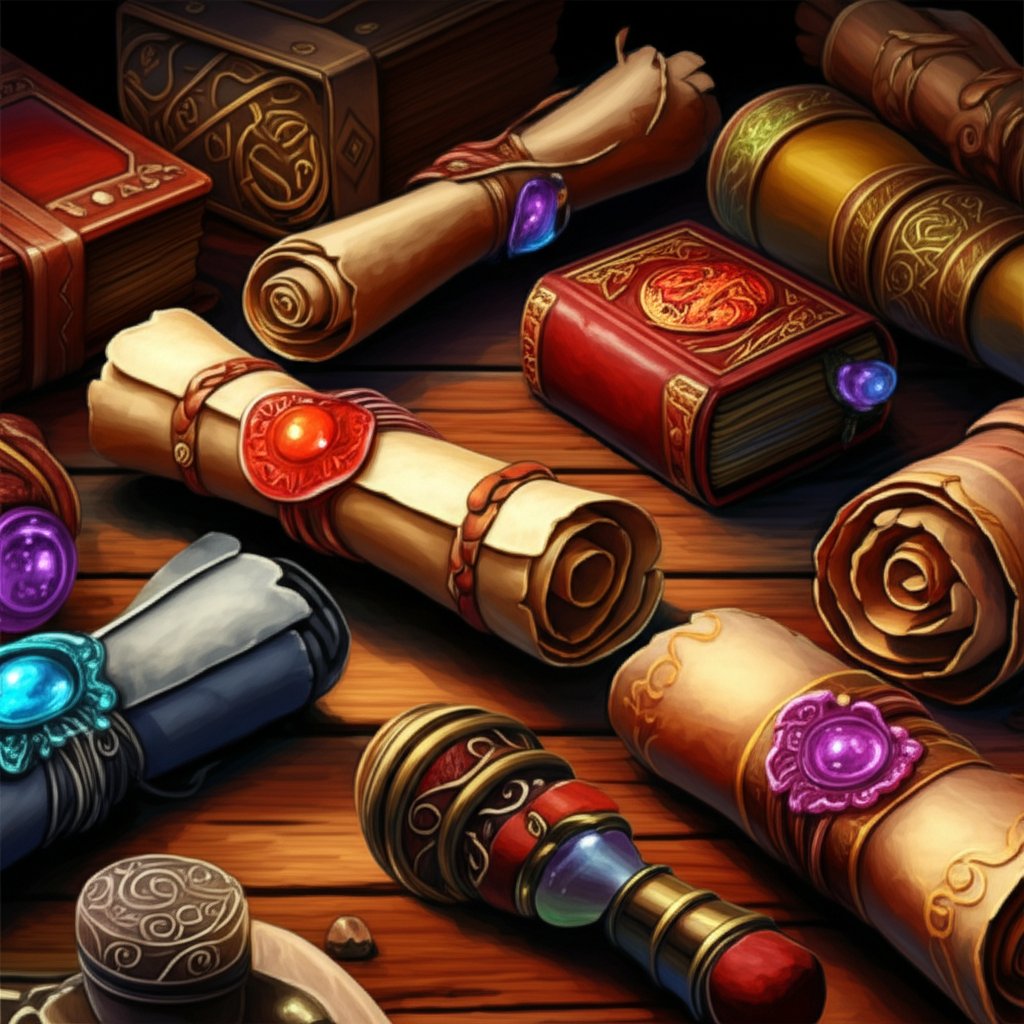
Top Generators for D&D 5th Edition Taverns
When you’re running a D&D 5e campaign, have you ever wished for a tool that instantly delivers names as rich and immersive as the world itself? Imagine you’re preparing a session set in Waterdeep, the jungles of Chult, or a mysterious Eastern-inspired city. You want every tavern to feel like it belongs—no matter the culture, race, or district. That’s where a specialized dnd 5e tavern name generator comes in, offering more than just random combinations—it helps you maintain lore accuracy and cultural depth.
What Makes a Great Tavern Name Generator for 5e?
Not all generators are created equal. When searching for the perfect tavern name generator 5e tool, consider these essential features:
- Race and Culture Filters: Can you generate names appropriate for dwarven halls, elven glades, or tiefling enclaves? The best tools let you specify the tavern’s cultural context, ensuring authenticity.
- Tavern Quality Options: Want a rundown dive, a bustling common room, or a high-end noble lounge? Look for generators that allow you to choose the tavern’s reputation, size, and clientele.
- Integration with 5e Lore: Does the tool reference established D&D 5e settings and naming conventions? Integration with other 5e generators—like innkeeper names or menu items—makes worldbuilding seamless.
- Customization and Visuals: Some advanced generators even let you tweak details or provide AI-generated art for your tavern, deepening immersion for players.
Top Picks: Standout Tavern Name Generators for D&D 5e
- Chinese Name Generator: If your campaign features an Eastern-inspired region, this tool is a must-have. It creates authentic, culturally nuanced names, letting you avoid tired tropes and instead introduce taverns like "The Quiet Moon" or "Jade Lantern Retreat." It’s perfect for DMs who want to enrich Kara-Tur, Shou, or homebrew Asian settings with real linguistic depth. Imagine a party entering a tea house named "静月" (Jìng Yuè, meaning "Quiet Moon")—the tone is set instantly, and the world feels more genuine.
- LitRPG Adventures Tavern Name Generator: This AI-powered tool crafts unique, lore-friendly names and even offers detailed backstories and visual elements for each tavern. You can customize by region, race, and style, ensuring the name fits seamlessly into your 5e campaign. Plus, it integrates with a library of NPCs and quests, so your tavern isn’t just a name—it’s a narrative hub. Learn more at LitRPG Adventures.
- Namebolds Tavern Name List: For DMs who prefer browsing curated lists, this resource offers hundreds of names, sorted by vibe and setting. While not a true generator, it’s a goldmine for inspiration and helps you see how different names evoke different moods—essential when matching a tavern to a specific 5e locale. Check their collection at Namebolds.
Why Cultural and Setting Consistency Matters
Ever notice how a mismatched name can pull players out of the story? If your elven city is filled with "Dragon’s Den"-style inns, it may break immersion. The best dnd 5e tavern name generator tools help you:
- Maintain consistency with established lore and setting
- Reflect the local culture, language, and history
- Enhance the narrative, making taverns feel like genuine parts of the world
In summary, choosing the right generator isn’t just about convenience—it’s about crafting a world where every tavern tells a story, fits its neighborhood, and enriches your campaign’s tapestry. Next, we’ll explore how these tools can help fantasy authors and worldbuilders create immersive establishments for their novels and settings.
Naming Taverns for Fantasy Novels and Worldbuilding
When you’re building a fantasy world—whether for a novel, tabletop game, or immersive storytelling project—have you ever found yourself stuck on the perfect name for that bustling inn or shadowy roadside tavern? The right name isn’t just a label; it’s a doorway into your world’s culture, history, and mood. So, how do you craft tavern names that feel real, memorable, and rooted in your setting?
Why Tavern Names Matter in Fantasy Fiction
Imagine your protagonist stepping into “The Gilded Griffin” or “The Silent Willow.” Instantly, the reader senses the atmosphere: opulent or serene, rowdy or mysterious. A tavern’s name can hint at local legends, reflect the dominant culture, or foreshadow events to come. In fantasy fiction, these establishments often serve as crossroads for plot, character development, and world lore.
- Atmosphere: Names like “The Misty Lantern” conjure a sense of magic or secrecy, while “The Iron Tankard” feels sturdy and welcoming.
- Cultural Depth: Referencing local flora, fauna, or mythic creatures can make a tavern feel like it truly belongs in your invented world.
- Narrative Function: A tavern named “The Whispering Mug” might be known for rumors and secrets, setting expectations for intrigue and plot twists.
Using a Fantasy Tavern Name Generator for Inspiration
Sounds daunting? That’s where a fantasy tavern name generator can help. These tools provide a wellspring of ideas tailored to different genres and tones. For example, a medieval tavern name generator might offer names rooted in European folklore—think “The White Hart” or “The Swan,” both of which historically signaled allegiance or local lore. But don’t stop at the first suggestion! The real magic happens when you:
- Mix generated names with your own cultural references
- Adapt names to fit your world’s geography or history
- Use the generator as a brainstorming tool, then refine for narrative impact
Consistent Naming Conventions for Multicultural Worlds
Ever notice how the best fantasy worlds have naming patterns that help you instantly recognize an elven city versus a dwarven stronghold? Consistent conventions—sound, structure, or meaning—signal cultural identity and make your world more immersive. Here’s how you can apply this to taverns:
- Elven Taverns: Names like “Moonshadow Glade” or “Silvermist Retreat” use gentle, lyrical language.
- Dwarven Taverns: Think “Ironfist Alehouse” or “Stonebeard’s Rest”—solid, strong, and rooted in the earth.
- Human or Mixed Culture: “The King’s Coin” or “The Crossroads Inn” might reflect broader social or political themes.
Maintaining this consistency helps readers or players intuitively grasp the setting and enhances the believability of your world.
Adding Global Depth: Authentic Eastern-Inspired Tavern Names
Want to move beyond standard Western tropes? Specialized tools like the Chinese Name Generator can bring authentic, poetic names to your Eastern-inspired establishments. Chinese names traditionally blend meaning, sound, and visual harmony—"静月" (Jìng Yuè, meaning “Quiet Moon”) could inspire a tavern called “The Quiet Moon House,” instantly evoking a tranquil, refined atmosphere. Here’s how to maximize these tools:
- Start with a culturally accurate surname or word
- Combine meaningful characters (like “jade,” “moon,” or “willow”) for layered significance
- Match the name’s tone to your story—historical, mystical, or modern
By weaving in authentic names, you avoid clichés and enrich your world with genuine cultural flavor.
Practical Example: From Generator to Story
Let’s say you’re writing a scene set in a bustling port city with a diverse population. Using a fantasy tavern name generator, you might get “The Salty Siren.” If the city has a large Eastern quarter, try blending in a name like “The Jade Lantern” or use the Chinese Name Generator for “翠竹楼” (Cuì Zhú Lóu, “Green Bamboo House”). Each name adds a new layer to your setting, hinting at different histories and communities.
Ready to make your taverns unforgettable? Next, we’ll explore how humor and wit can be woven into your names, adding levity and personality to your world’s favorite gathering spots.
Injecting Humor with Funny Tavern Name Generators
Ever wondered why some tavern names make you grin before you even step inside? If you’ve searched for a funny tavern name generator or wanted a catchy tavern name generator, you’re not alone. Humor is a powerful tool in storytelling and game design—it breaks the ice, sets a playful tone, and can even foreshadow the kind of adventures (or misadventures) that await your characters. But what makes a tavern name genuinely funny, and how can you use humor to enhance your setting?
Why Humor Works in Tavern Names
Picture your players or readers arriving at “The Tipsy Turtle” or “The Soggy Bottom.” Instantly, there’s a sense of fun and approachability. A witty or pun-filled tavern name can:
- Signal that the establishment is a place for lighthearted encounters
- Set expectations for comedic NPCs, silly side quests, or memorable mishaps
- Break up the tension in otherwise serious or dramatic settings
Humorous names are also easier to remember, making them perfect for recurring locations or running jokes throughout your campaign or novel.
Types of Humor in Tavern Names
Sounds tough to get right? Not if you know the main categories of tavern humor. Here are the most popular approaches you’ll find in both classic and modern settings:
- Puns and Wordplay: These are the backbone of funny tavern names. Examples include:
- The Tipsy Turtle
- The Drunken Duck
- The Wobbly Wagon
- The Soused Squirrel
The play on words instantly creates a sense of whimsy and can hint at the tavern’s signature drink or mascot.
- Pop Culture References: Sometimes, a subtle nod to well-known stories or tropes adds an extra layer of fun. Think of names like:
- The Prancing Pony (a nod to Tolkien)
- The Drunken Clam (from "Family Guy")
- The Rusty Dragon (from "Pathfinder")
These references reward attentive players and readers with a wink and a smile.
- Irony and Exaggeration: Some tavern names are funny because they’re wildly over the top or hilariously understated:
- The Soggy Bottom (for a tavern with notoriously leaky ceilings)
- The Stumbling Stag (where everyone leaves unsteady)
- The Happy Hiccup (embracing the inevitable after too many drinks)
Irony can also come from naming a tiny, cozy bar something grandiose—like “The Dragon’s Palace.”
How a Catchy, Funny Name Shapes the Experience
When you choose a humorous name, you’re doing more than just getting a laugh. You’re setting the stage for what happens inside. For example:
- “The Chuckling Chicken” might be home to a bard who only sings comedic songs.
- “The Dizzy Dodo” could be the site of slapstick contests or wild drinking games.
- “The Merry Moose” might host pun-filled trivia nights or serve dishes with silly names.
These names encourage both players and readers to let loose, try new things, and embrace the unpredictable. They can also serve as plot hooks—maybe the “Bumbling Bee” is famous for a honey mead that causes magical mishaps, or the “Plastered Parrot” is a haven for gossip and rumors.
Practical Tips: Using a Funny Tavern Name Generator
Ready to add some laughter to your world? Here’s how to get the most out of a funny tavern name generator:
- Generate several names and pick the one that best matches your setting’s tone.
- Don’t be afraid to tweak the result—combine two funny names or add a local twist.
- Consider the story behind the humor. Is the tavern’s name a running joke in the town, or does it reference a legendary (and hilarious) event?
Above all, remember: a great name is just the beginning. Let it inspire the personalities, drinks, and stories that make your tavern a place players and readers want to return to again and again.
Next, we’ll dive into how themed tavern names—like pirate, elven, or dwarven—can further immerse your audience and help you craft legendary establishments for any fantasy setting.
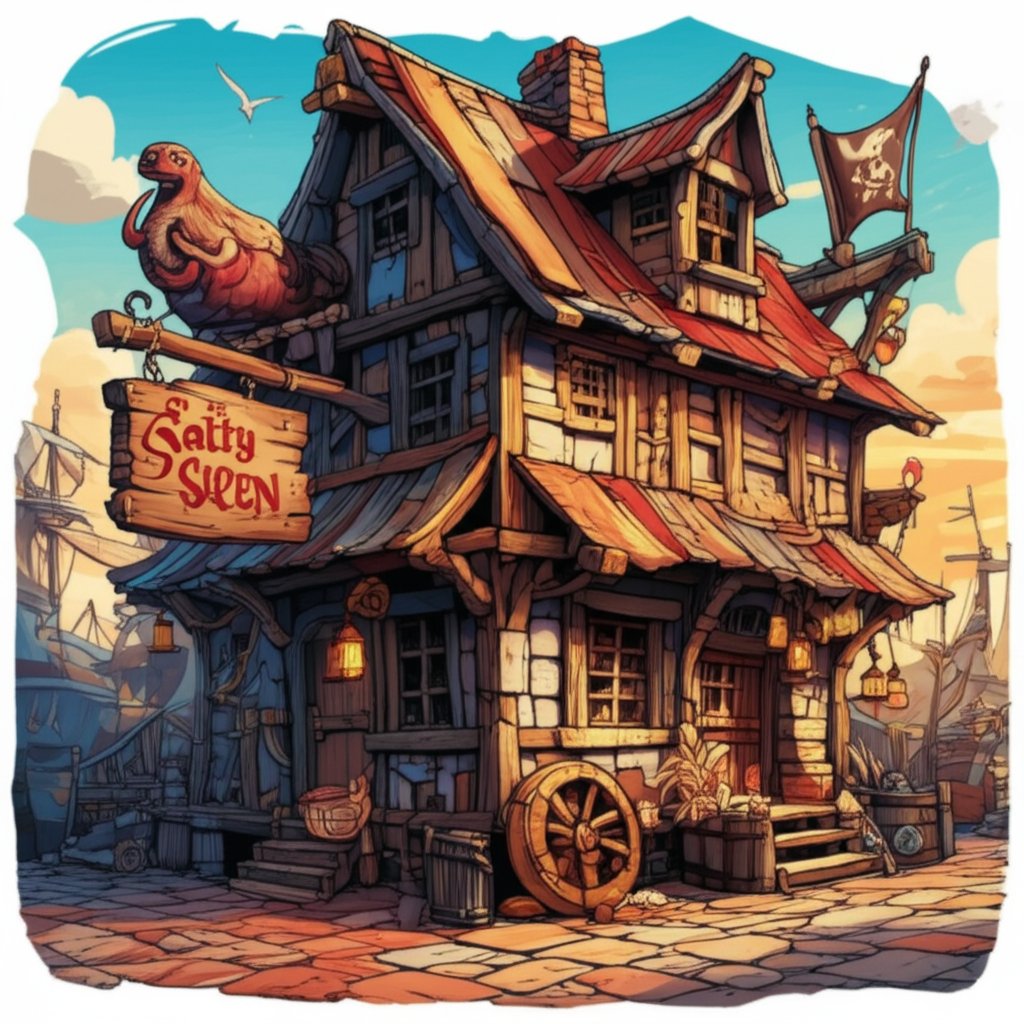
Setting the Scene with Pirate and Themed Tavern Names
When you picture a raucous port-side bar with swinging lanterns, the scent of salt and grog in the air, and tales of krakens and buried treasure echoing off the walls—what comes to mind? Chances are, it’s a pirate tavern, bursting with personality and adventure. But how do you craft a name that instantly conjures this atmosphere? That’s where a pirate tavern name generator shines, offering a trove of evocative options to anchor your world in a specific theme.
Why Thematic Naming Matters for Immersion
Sounds like a small detail? Actually, the right themed name can make or break immersion. Whether your story or campaign features pirates, elves, dwarves, or a shadowy thieves’ den, a well-chosen tavern name acts as a shortcut to mood, setting, and even plot. For example, a pirate tavern called “The Salty Dog” or “The Rusty Cutlass” instantly signals a rough-and-tumble crowd and a sense of high-seas adventure. Meanwhile, “The Enchanted Grove” or “Stonebeard’s Rest” sets entirely different expectations for elven or dwarven patrons.
Pirate Tavern Name Generator: Key Elements and Inspiration
If you’re searching for pirate-themed names, focus on words and imagery tied to nautical life, danger, and legendary exploits. Here are some elements you’ll often find in a pirate tavern name generator:
- Seafaring Objects: Anchor, Cutlass, Compass, Cannonball
- Legendary Creatures: Kraken, Siren, Sea Serpent
- Pirate Lore: Jolly Roger, Buccaneer, Plunder, Booty
- Atmospheric Words: Salty, Stormy, Driftwood, Crimson
- Drinks & Merriment: Grog, Rum, Shanty, Tavern
Combine these elements for names like “The Kraken’s Lair,” “The Scurvy Dog,” or “The Treasure Chest.” Each name paints a vivid picture and invites players or readers to dive into the world’s lore.
Beyond Pirates: Themed Taverns for Every Setting
Of course, pirates are just one flavor. Themed taverns can be found across every corner of fantasy, from the mystical elven woods to the bustling dwarven halls. Here’s how different themes use naming conventions to set the scene:
| Theme | Key Naming Elements | Example Name | Atmosphere / Vibe |
|---|---|---|---|
| Pirate | Grog, Anchor, Kraken, Treasure, Storm | The Rusty Anchor | Rowdy, adventurous, nautical |
| Elven | Moon, Silver, Grove, Leaf, Whisper | The Moonlit Glade | Elegant, mystical, nature-inspired |
| Dwarven | Forge, Stone, Ale, Hammer, Deep | Stonebeard’s Rest | Hearty, robust, underground |
| Thieves’ Den | Shadow, Whisper, Dagger, Cloak, Secret | The Whispering Dagger | Mysterious, secretive, dangerous |
| Viking | Horn, Mead, Frost, Wolf, Saga | The Odin’s Horn | Bold, boisterous, heroic |
Notice how each theme relies on specific motifs and word choices. This not only signals the clientele and setting but also helps your audience instantly understand what kind of adventures might unfold inside.
Drawing Inspiration from Famous Tavern Names
Looking for a name with proven staying power? Many famous tavern name generator results draw inspiration from classic literature and pop culture. Think “The Prancing Pony” (Tolkien), “The Leaky Cauldron” (Harry Potter), or “The Yawning Portal” (D&D). These names are memorable because they blend theme, setting, and a touch of narrative intrigue.
When you use a generator, don’t just settle for the first name it offers. Mix and match elements, tweak the phrasing, or add a local touch—like referencing a legendary pirate captain or a mythical sea monster unique to your world.
Practical Tips for Themed Tavern Naming
- Start with your setting’s core theme—pirate, elven, dwarven, or otherwise.
- List 3–5 evocative words or motifs that define the culture or vibe.
- Use a generator to spark ideas, then refine with your own lore or geography.
- Ensure the name fits the tone of your story or campaign: is it lighthearted, mysterious, or epic?
- Test the name out loud—does it roll off the tongue and stick in your memory?
By focusing on thematic elements and drawing from both generators and your own creativity, you’ll craft tavern names that are as legendary as the adventures that begin within them. Up next, we’ll explore how to extend this creativity to your tavern keepers and the lore that brings your establishments to life.
Beyond the Name
When you imagine your world’s most memorable tavern, what brings it to life—the décor, the menu, or perhaps the person behind the bar? More often than not, it’s the tavern keeper who leaves a lasting impression. But how do you create owners and staff who feel as real and compelling as your setting? That’s where a tavern keeper name generator or tavern owner name generator can become your secret weapon for deep worldbuilding and storytelling.
Why the Tavern Keeper Matters
Sounds obvious, right? Yet, in countless games and stories, the tavern owner fades into the background as a nameless NPC. But when you give the keeper a distinctive name, personality, and backstory, you instantly add layers of intrigue and authenticity. Imagine Eldra of the Hearthbound Hearth, whose warmth rivals the fire she tends, or the enigmatic Tamsin of the Shattered Hourglass, rumored to have bargained with a timekeeper for her craft. These characters don’t just serve drinks—they shape the tavern’s mood, reputation, and the stories that unfold within its walls.
- Atmosphere: The owner’s demeanor—cheerful, mysterious, gruff—sets the tone for every patron’s experience.
- Plot Hooks: Tavern keepers can be fonts of local gossip, quest givers, or secret allies (or enemies).
- Worldbuilding: A well-named owner hints at the tavern’s origin, culture, and even the neighborhood’s history.
How to Use a Tavern Keeper Name Generator
When you’re stuck for ideas, a generator can spark inspiration with just a click. But how do you make the most of it? Here’s a step-by-step approach:
- Choose a Language or Culture: Many generators, like the one from Scabard, let you select from over 20 languages—including German, Latin, and Norse. This helps you match the owner’s name to your setting’s flavor.
- Refine with Personality Prompts: Is your innkeeper eccentric, stoic, or renowned for their kindness? Answering a few quick prompts can tailor the generated names to fit your vision.
- Mix and Match: Don’t hesitate to tweak results or combine elements from different names. For example, "Fenwick of Whispering Pines Lodge" or "Rhiama of the Cozy Cauldron" each tell their own story through name alone.
- Connect Name to Lore: Once you have a name, think about how it ties into the tavern’s reputation. Did "Brevin of the Gilded Mug" win a legendary drinking contest? Is "Marisella of the Enchanted Lantern" rumored to have magical ancestry?
Adding Depth with Culturally Rich NPCs
Want to move beyond the usual Western-inspired settings? This is where the Chinese Name Generator truly shines. Authentic Chinese names carry deep meaning, with each character chosen for its symbolism and sound. Here’s how you can use it to create unforgettable innkeepers and staff:
- Start with a Surname: Most Chinese family names are just one character, hinting at ancestry or geography. Try "Wang" or "Li" for instant credibility.
- Combine Meaningful Characters: Pair characters like "Yue" (moon) and "Ling" (spirit) for a poetic name such as "Yueling." This could inspire a proprietor known as "Madam Yueling of the Quiet Moon Tavern."
- Match the Name to Personality and Lore: Is your NPC a wise matriarch, a mysterious herbalist, or a jovial host? The right name can encapsulate their role and backstory in a few syllables.
- Balance and Harmony: Just as in poetry, a good name balances meaning, sound, and visual appeal. Read it aloud—does it fit your world’s tone?
By leveraging a culturally authentic name generator, you not only avoid generic tropes but also add global depth and realism to your fantasy setting. Whether your world features a bustling Eastern-inspired district or a remote mountain inn, these tools help you create NPCs who feel like they truly belong.
Example Table: From Name to Narrative
| Generated Name | Tavern Name | Atmosphere | NPC Backstory Idea |
|---|---|---|---|
| Yueling | The Quiet Moon Tavern | Tranquil, refined | Former palace chef, now a wise, discreet host to travelers and nobles alike |
| Borin | The Drowsy Dragon | Hearty, rustic | Claims to have wrestled a dragon for a barrel of ale—truth unknown |
| Elowen | The Sunkissed Nook | Warm, welcoming | Beloved by locals for her laughter and legendary comfort food |
| Tamsin | The Shattered Hourglass | Mysterious, magical | Rumored to have bargained with a timekeeper for her brewing skills |
By giving your tavern keepers meaningful names and backstories, you transform every establishment from a mere setting into a living part of your world. Ready to make your names truly unique? Up next, we’ll show you how to customize generated names for a perfect fit in your story or campaign.

How to Customize Generated Names to Fit Your World
Ever clicked through a custom tavern name generator and thought, “That’s close, but not quite right for my story or campaign”? You’re not alone. While generators are fantastic for sparking ideas, the most unique tavern names are often the result of a little extra creativity and thoughtful tweaking. So, how do you transform a generated name into something that feels perfectly at home in your world?
Step-by-Step Guide: Personalizing Your Tavern Name
Let’s break down the process into simple, actionable steps. Imagine you’ve just generated a list of names—what’s next?
- Combine Names for Fresh Results
Don’t feel limited to a single suggestion. Try mixing elements from two or more generated names. For example, if you get “The Blazing Boar” and “The Enchanted Mug,” you might create “The Enchanted Boar” or “The Blazing Mug.” This approach instantly multiplies your options and can help you find a name that stands out. - Tweak the Language to Match Your Setting
Adjust words and phrasing to fit your world’s culture, geography, or era. For a medieval vibe, swap modern words for older ones—“The Drunken Dragon” could become “The Soused Serpent.” If your setting is inspired by a specific culture, use appropriate language or motifs for authenticity. - Add Local Touches and Lore
Personalize the name by referencing local landmarks, legends, or famous figures in your world. For example, “The Whispering Pines Inn” might sit near a haunted forest, while “The Bannered Mare” could honor a historic battle or local hero. These details instantly embed your tavern in its setting. - Check the Meaning and Pronunciation
Make sure your name isn’t too hard to say or spell—simplicity helps with memorability and word-of-mouth. Also, check that the name doesn’t have unintended meanings in other languages or cultures, especially if your world draws from real-world influences.
Practical Examples: From Generator to Signature Name
Let’s see these steps in action. Suppose your generator gives you “The Merry Minstrel” and “The Silent Shadow.” Maybe your story is set in a city famous for its night markets and music. Here’s how you might customize:
- Combine: “The Merry Shadow” or “The Silent Minstrel”
- Tweak Language: Use local dialect—“The Jolly Shade” or “The Hushed Bard”
- Add Local Touch: “The Night Market Minstrel” or “The Shadow’s Song Tavern”
- Check Meaning: Say the names aloud and ask friends for feedback—does it fit the mood you want?
Tips for Ensuring Your Tavern Name Is Truly Unique
- Search online and in fantasy name lists to make sure your chosen name isn’t already famous or trademarked.
- Ask for feedback from your gaming group, writing circle, or community—sometimes a fresh perspective reveals hidden gems or potential issues.
- Consider the story behind the name. Does it hint at a past event, a local legend, or a beloved NPC? Even a short backstory can make your tavern unforgettable.
“A generated name is just the beginning—the real magic happens when you make it your own.”
By following these steps and infusing each name with your own creativity, you’ll ensure every tavern in your world feels authentic, memorable, and deeply connected to your setting. Up next, we’ll tie everything together and empower you to start creating legendary taverns that leave a lasting impression on every adventurer, reader, or guest who crosses their threshold.
Conclusion
When you look back at all the famous fantasy tavern names—from "The Prancing Pony" to "The Rusty Anchor"—what do they have in common? Each one is more than just a sign above a door; it’s an invitation into a living, breathing world. So, how do you craft that same magic in your own settings? Let’s quickly recap the strategies that will help you unlock legendary names and unforgettable tavern experiences.
Key Strategies for Crafting Memorable Tavern Names
- Understand Core Naming Elements: Start with proven conventions—Adjective + Noun, Owner’s Name, or local landmarks. The right structure instantly sets the mood, whether it’s cozy, mysterious, or wild.
- Explore Genre-Specific Generators: Use a tavern name generator tailored for your world—D&D, high fantasy, or medieval. These tools spark inspiration and help maintain consistency across your setting.
- Dive into Themed and Cultural Naming: Pirate, elven, dwarven, and thieves’ den taverns all have their own naming motifs. Themed generators make it easy to match the vibe, while culturally authentic tools—like the Chinese Name Generator—add global depth and realism.
- Build Lore and Character: Don’t stop at the sign. Use generators for tavern keepers and staff names, and connect each establishment to its own mini-story or legend. This turns every tavern into a living part of your world.
- Customize and Personalize: Tweak generated names to fit your geography, history, and tone. Mix and match, add local touches, and always check for uniqueness to ensure your tavern stands out.
Your Tavern Name Generator: A Creative Partner, Not a Crutch
Remember, a generator isn’t a shortcut to creativity—it’s a springboard. Use it to overcome writer’s block, explore new cultural influences, or simply speed up your worldbuilding process. The best names happen when you blend algorithmic inspiration with your own imagination and narrative needs.
Ready to Create Legendary Taverns?
- Start experimenting with different generators—especially culturally rich options like the Chinese Name Generator for authentic Eastern-inspired names.
- Think about the story you want each tavern to tell. Is it a bustling pirate haunt, a tranquil mountain retreat, or a mysterious city den?
- Don’t be afraid to revise, combine, or invent entirely new names. Your creativity is the final ingredient.
Every great adventure starts with a single step—or a single door creaking open to reveal a world of possibility. With the right tools and a dash of imagination, you’ll craft fantasy tavern names that invite heroes, readers, and players to linger, laugh, and remember. So go ahead: unlock your next legendary tavern name and watch your world come alive.
Tavern Name Generator FAQs
1. What makes a tavern name memorable in fantasy settings?
A memorable tavern name uses evocative language and classic naming patterns, such as Adjective + Noun or Owner’s Name. It should fit the tavern’s atmosphere and hint at its role in the story, helping immerse players or readers in the world.
2. How can I use a tavern name generator for D&D campaigns?
Use a tavern name generator to quickly create names that match your campaign’s tone, location, and clientele. Many generators offer filters for race, culture, or setting, making it easy to find names that align with D&D lore and your adventure’s needs.
3. Are there tools for creating culturally authentic tavern names?
Yes, tools like the Chinese Name Generator provide culturally rich and meaningful names, ideal for Eastern-inspired settings. These generators consider traditional naming patterns and character meanings, adding depth and authenticity to your world.
4. How do I customize generated tavern names to fit my story?
Combine elements from multiple generated names, tweak language to match your setting, and add local references or lore. Personalizing names ensures they feel unique and relevant, enhancing immersion for your audience.
5. Can I generate names for tavern keepers and staff as well?
Absolutely. Many generators include options for tavern keeper or owner names. Choosing culturally or thematically appropriate names for staff adds another layer of realism and helps flesh out your world’s backstory.
